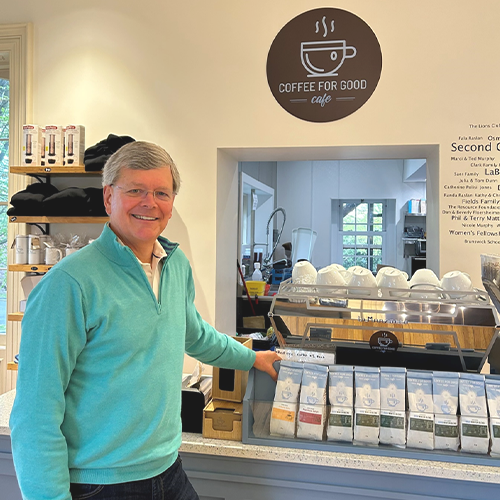William Selkirk Owen was a prominent figure in the world of naval architecture and marine engineering, having greatly influenced the development of Webb Institute as both professor and Dean of Faculty. His unwavering support for Webb and its students, combined with his commitment to excellence and strong character, left a lasting impact on the institution. In his honor, the Webb Alumni Association established the William Selkirk Owen Award to recognize outstanding achievement and service.
We are delighted to introduce this month’s blogger and the 2022 William Selkirk Owen Award recipient, Jon J. LaBerge, who is also a dedicated member of Webb’s Board of Trustees and an accomplished professional. Jon’s dedication embodies the spirit of Webb and the prestigious award named after W. Selkirk Owen.
In this blog post, Jon shares his journey from his student days at Webb to his thriving career and community service. He speaks on the role that Webb played in shaping him as a leader and committing to social responsibility. Read on to learn more about his unique perspective and how his Webb experiences have made a great impact on his life and career.
In recognition of his invaluable contributions to Webb, please join us in honoring Jon J. LaBerge as the 2022 William Selkirk Owen Award recipient during our Homecoming event on campus, scheduled for May 20, 2023. We hope to see you there.
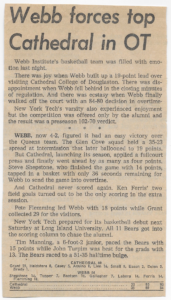
Webb Basketball’s Winning Streak: Webb’s Basketball has a brief moment in history as it is commemorated in a rare news clipping and is unmatched for decades to come.
Considering who William Selkirk Owen is and the contributions he has made to Webb, what does receiving this prestigious award mean to you?
William Selkirk Owen was the Dean of Webb for 22 years from 1928 to1950. The Webb Alumni Association created an award in his honor in 1964. It is presented annually in recognition of outstanding achievement and service to the profession and to Webb. I am honored and grateful to the Alumni Association for selecting me as the 2022 recipient of this award not only because of the legacy of Dean Owen and the fact that it represents a recognition from my peers and fellow alumni, but also because of the respect that I have for each of the previous 56 recipients. Of those previous recipients, five were my professors while I was a student at Webb and probably a dozen or more are current or former trustees with whom I have worked during the past twelve years. Their example of service to Webb inspired me to become a trustee and I only hope that my service will help to inspire the next generation of trustees who will lead Webb into a sustainable future.
In what ways do you think your experience at Webb prepared you to be a leader?
Webb gave me the technical knowledge and credibility that allowed to make immediate contributions and quickly move into project management roles early in my career. But my experience at Webb offered me more than just a great engineering education. Byproducts of my winter work semesters were the life skills and confidence to arrange housing on short notice, provide for my own meals and transportation, and demonstrate reliability and professionalism to my employers. We might all take those experiences for granted now, but I think it is a differentiator in a competitive job market that allows our grads to hit the ground running and transition quickly into contributing members of their companies and society. As chair of the athletic committee at Webb, I took responsibility for programs like intramural and intercollegiate sports, that improved the experiences of my fellow students. As a member of the Honor Council, I was asked to make difficult decisions and evaluate the actions of my peers, including an unfortunate situation in which we recommended that a fellow student be dis-enrolled for disrespecting Webb’s Honor Code. All of these things gave me a maturity that allowed me to progress in my career quickly immediately after graduation.
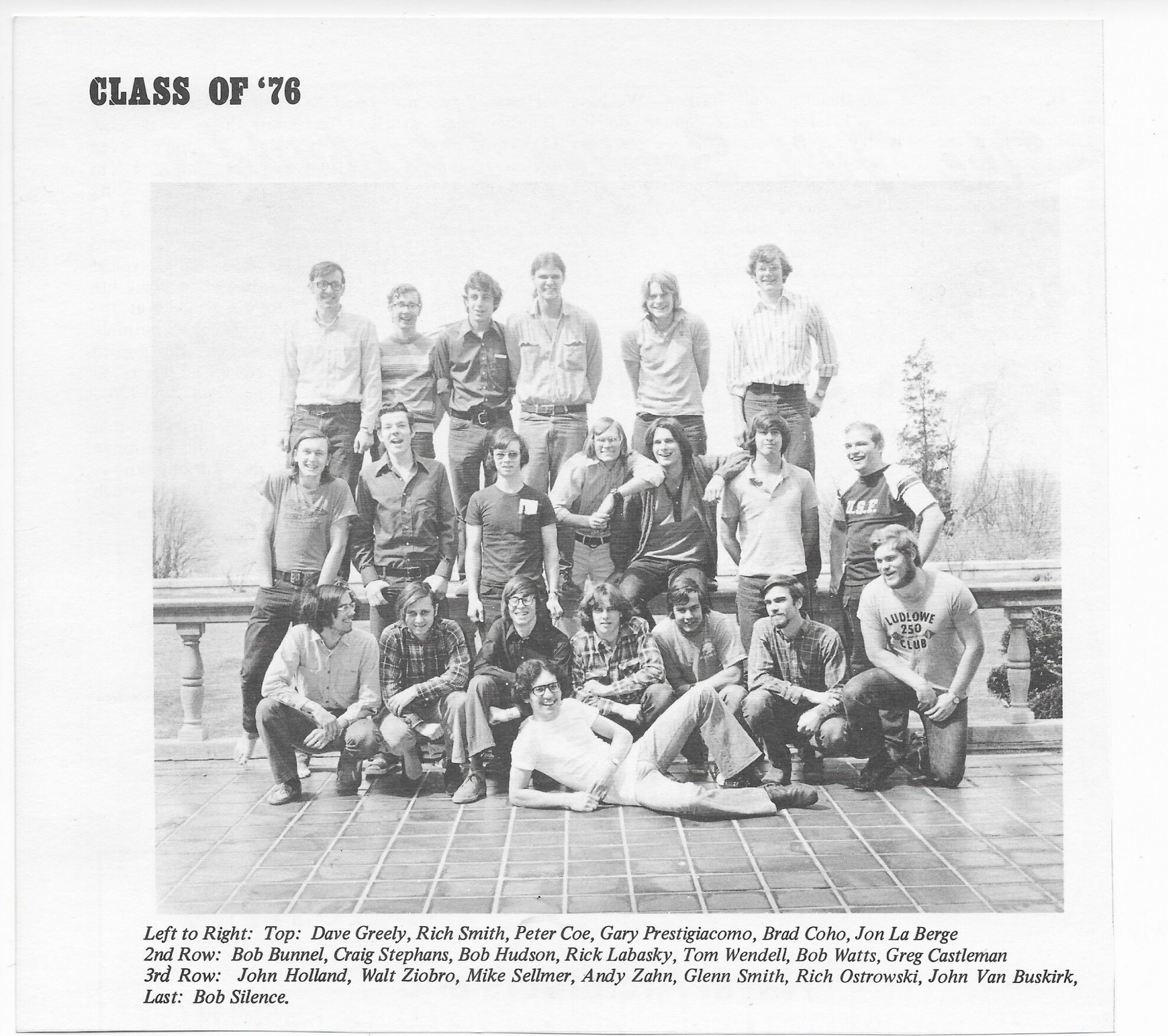
Fresh Faces of the Class of ’76: Jon is pictured on the top right with his freshmen Webb classmates.
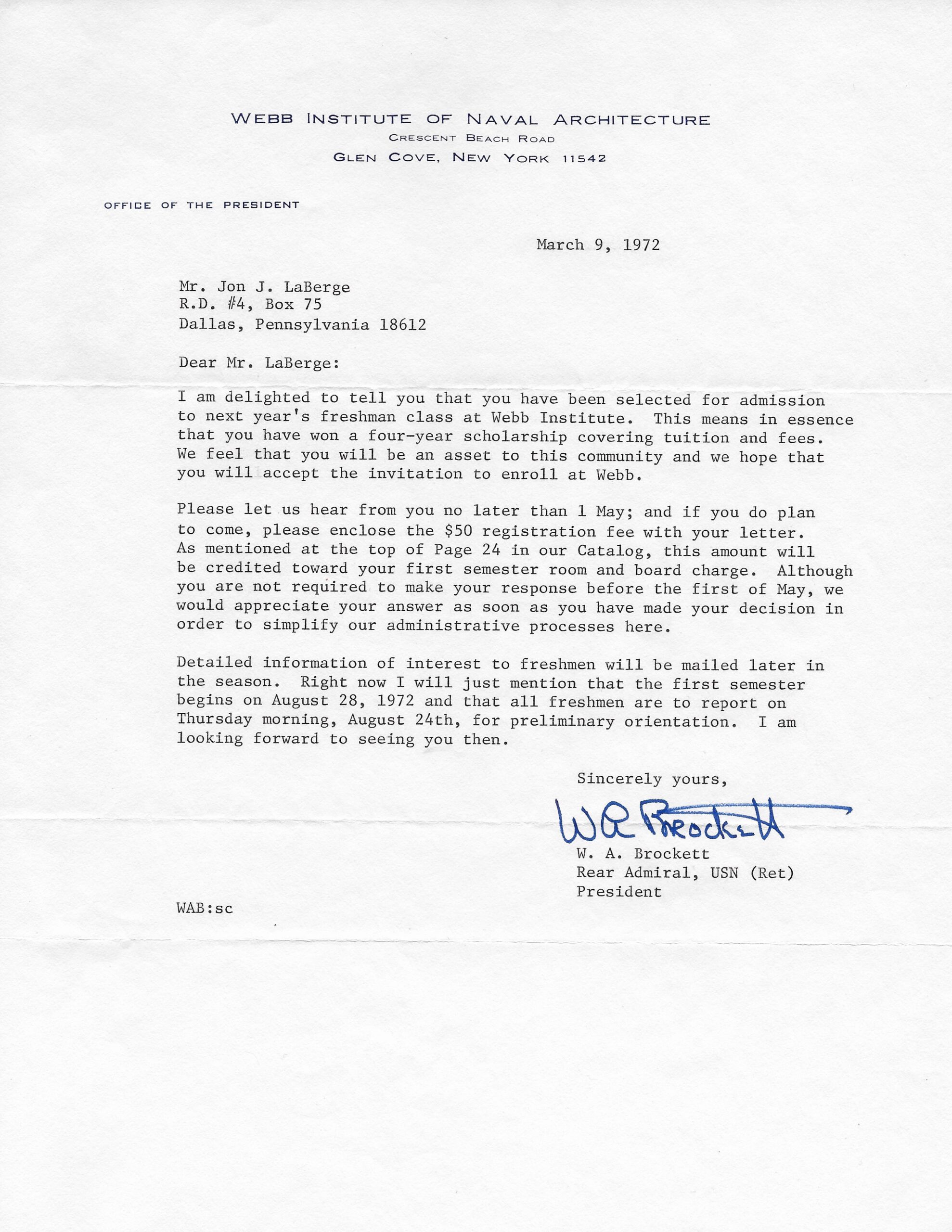
Vintage Note: Jon received a milestone – his 1972 acceptance letter from Webb with a four-year full scholarship covering tuition and fees.
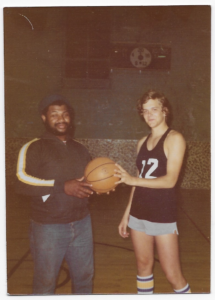
Iconic Duo: Jon and Coach Oscar Steadman celebrate a winning streak in Webb Institute’s Basketball history.
After Webb, you had gone to other prestigious organizations, from Harvard Business School to Gibbs & Cox. What is your proudest career accomplishment?
As I look back at my career, it is hard to identify a single project or transaction that stands out as a career-defining accomplishment. Rather I am most proud of two characteristics that thread their way throughout my career. First, I had the opportunity to work for a number of impressive managers at various stages of my career and I am proud of the fact that in several cases I worked for them multiple times. It’s one thing to convince someone that you are the right candidate for a job during an interview. It is quite another when someone who knows you well and has worked with you in the past comes to you and asks you to join them again at a different company or new position. This happened to me five different times in my career and is a testament to the work ethic that I learned and developed while at Webb. Second, I am proud of the impact I have had on young people that I hired into my organizations. By providing them with structure, resources, and opportunities and encouraging them to develop their own sense of intellectual curiosity and work ethic, I am proud of their accomplishments and the professionals that they have become.
You work with a non-profit organization, Coffee for Good which emphasizes community service and social responsibility. What lessons from this experience do you take to your work at Webb and in life in general?
It is really more the other way around. When I joined the Board at Webb, I had limited experience working with non-profit organizations. The terminology, the accounting treatments, the reliance on fund raising rather than sales to support the mission, were all new to me. As Chair of the Finance Committee of Webb’s Board for ten years I have come to understand the keys to a successful non-profit operation. It all comes down to having a mission that resonates with a community that is willing to support that mission. We are fortunate to have that in abundance at Webb where our alumni, friends, and the industry support Webb year after year. This is a tribute to the philanthropy of our founder William Webb. Regarding Coffee for Good, my wife and I were involved in its founding because of its mission and how that mission resonates with its community. Coffee for Good (coffeeforgood.org) operates a high-end coffee shop in Greenwich Connecticut that serves as a training platform for special needs young adults, works with local employers to define appropriate job responsibilities for our trainees, and then matches our graduates up with those jobs. As a start-up, it was important for Coffee for Good to have individuals involved who understood all aspects of facilities, operations, finance, development, etc. This is where my experience at Webb has allowed me to have a material impact on Coffee for Good’s successes to date.

A Founding Member of Coffee for Good: Jon helps empower people with disabilities and believes in fostering an inclusive community that gives jobs and opportunities to all.

LaBerge Terrace: The sustainable rooftop terrace was sponsored by Jon, his wife, Deborah, and their son, Peter as part of the Campaign for Webb.

Family Portrait: Jon, Deborah, and their son, Peter – capture love, warmth, and support all in one frame.
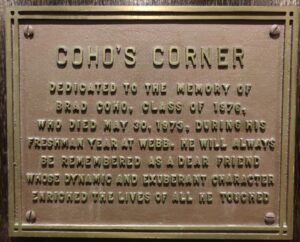 Can you share a story or experience from your time at Webb that still resonates with you?
Can you share a story or experience from your time at Webb that still resonates with you?
I could tell you something about the long hours of hard work that many Webb students can relate to, or Webb’s (almost) winning season in basketball in 1974, but instead I would like to share a somber remembrance that has special meaning for the Class of ’76. Fifty years ago this month, as my class was wrapping up its freshman year at Webb, we lost our first classmate due to complications following an emergency appendectomy over Memorial Day weekend. Brad Coho was the life of every party, an accomplished sailor and soccer player, the president of our freshman class and my roommate at Webb. I bring this up, not to put a damper on this blog post, but to ask that next time you are on Webb’s campus, look for the bronze plaque on the wall in the Pub near the pool table that designates that spot as “Coho’s Corner”, think of the promising young life cut short, and remember to make the most of the time that you have with your friends and family – life is short, way too short in Brad’s case.
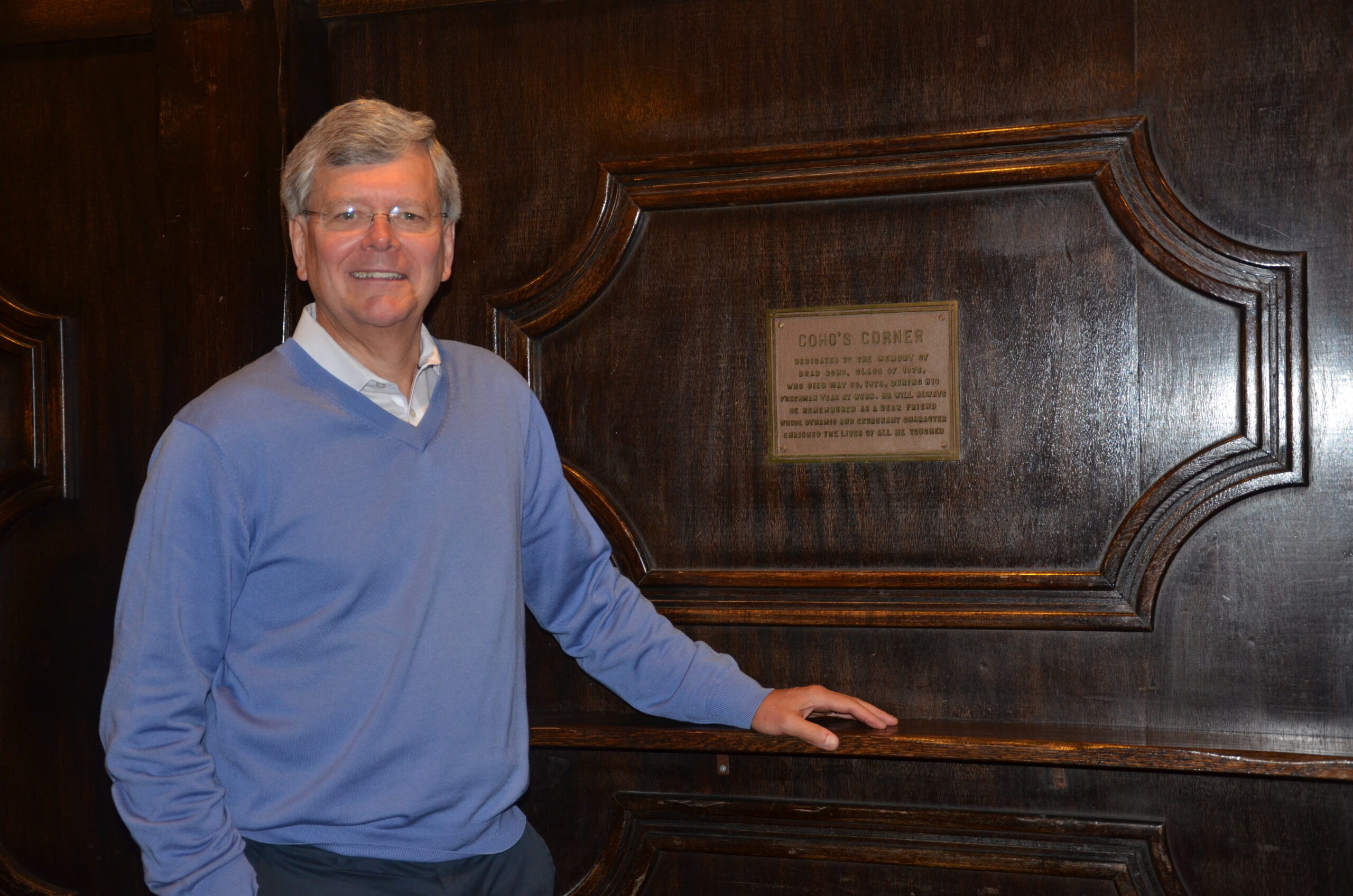
Coho’s Corner: Jon stands beside a plaque at Webb’s pub, honoring his late roommate and friend, Brad Coho.
What advice do you have for students on life after graduation?
After spending four years with a bunch of over achieving, highly motivated, intellectually capable classmates, be confident as you move into this next chapter in your lives, regardless of where you ranked in your class at Webb. Not everyone you will work with will approach technical challenges in the same rigorous way that you and your Webb classmates do. This is a real strength that you can bring to your new employer that will differentiate you and create opportunities for you. By the way, this applies whether you choose to work in the marine industry or branch off into an entirely different career. I spent over half of my career in financial services and I used my Webb education every day. Aside from your professional endeavors, make an effort to find time to stay in shape physically (you won’t be 22 forever), and volunteer your time to a cause that has meaning for you. Whether this is a technical panel, a professional society, Webb’s Board or Alumni Association, or a local religious organization or charity; they could all benefit from your experiences and expertise and your involvement could materially add to your satisfaction and quality of life. Pick a cause that has meaning for you, make a commitment, work hard and good things will happen. And lastly, support your alma mater. It really is a special place and has launched the careers of nearly 2,000 young adults over the past 130 years. You are the legacy of William Webb – pay it forward to the next generation.

